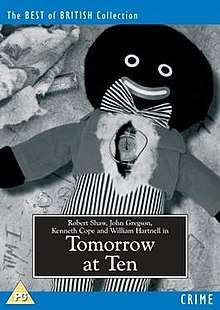Tomorrow at Ten
Tomorrow at Ten is a 1962 British thriller film directed by Lance Comfort and starring John Gregson, Robert Shaw, Kenneth Cope and William Hartnell.[1]
| Tomorrow at Ten | |
|---|---|
 | |
| Directed by | Lance Comfort |
| Produced by | Tom Blakeley |
| Written by | James Kelley Peter Miller |
| Starring | John Gregson Robert Shaw Alec Clunes Alan Wheatley |
| Music by | Bernie Fenton |
| Cinematography | Basil Emmott |
| Edited by | Peter Pitt John Trumper |
Release date | 1962 |
Running time | 80 mins |
| Country | United Kingdom |
| Language | English |
Plot
A man places a time bomb inside a golliwog.
A man calling himself Marlow kidnaps Jonathan Chester, the young son of wealthy industrialist Anthony Chester, and locks him in a rented house. He then goes to see the boy's father and announces that he will only reveal his whereabouts once he has been paid £50,000 (a large sum at the time) and is safely in Brazil. The boy's nanny alerts the police and Inspector Parnell arrives to discourage Chester from paying up lest it send out a signal to give in to blackmailers. Marlow then reveals that a bomb is in the house where Jonathan is kept and will go off at 10 a.m. the next day. This is too much for Chester who attacks Marlow, causing the crook serious injuries from which he later dies, leaving the police with little time or indication as to where to find Jonathan.
Cast
- John Gregson as Inspector Parnell
- Robert Shaw as Marlow
- Alec Clunes as Anthony Chester
- Alan Wheatley as Assistant Commissioner Bewley
- Kenneth Cope as Sergeant Grey
- Ernest Clark as Dr Towers
- Piers Bishop as Jonathan Chester
- Helen Cherry as Robbie
- William Hartnell as Freddie Maddox
- Betty McDowall as Mrs Parnell
- Harry Fowler as Smiley
- Renée Houston as Masie Maddox
- Alan Curtis as Inspector
- Noel Howlett as Brain specialist
- Trevor Reid as Q Detective
- Ray Smith as Briggs
Critical reception
Tomorrow at Ten was selected by the film historians Steve Chibnall and Brian McFarlane as one of the 15 most meritorious British B films made between World War II and 1970. While they praise the characterization, the performances, the production design, the cinematography and the screenplay, they say that "the film's real strength is in the direction of the veteran Lance Comfort in one of his last films".[2]
References
- BFI.org
- Steve Chibnall & Brian McFarlane, The British 'B' Film, Palgrave Macmillan, London, 2009, pp. 281–82.